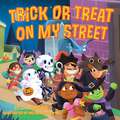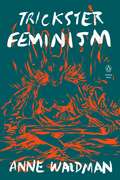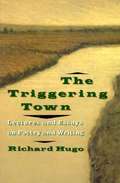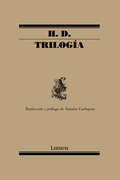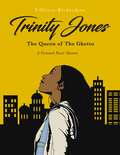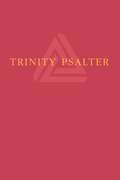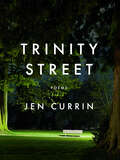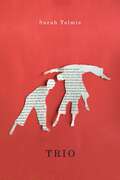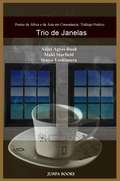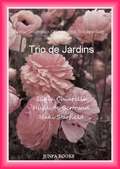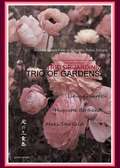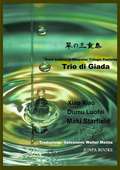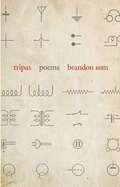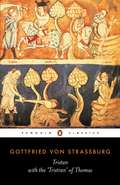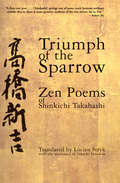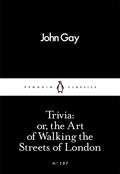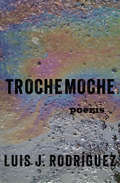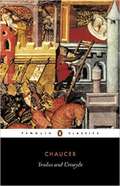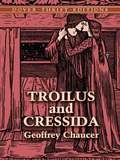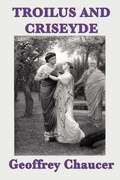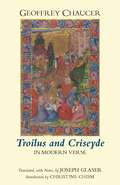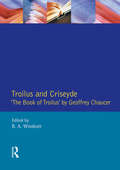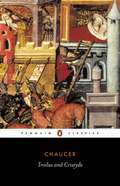- Table View
- List View
Trick or Treat on My Street
by J. L. CoppageCome with me and trick-or-treat from house to house along my street!Head down the block with a group of kids as they get ready to go trick-or-treating on Halloween night! With bright, fun illustrations and bouncy, rhyming text, Trick or Treat on My Street is perfect for little monsters everywhere!
Trickster Feminism (Penguin Poets)
by Anne WaldmanNew from celebrated poet and performer Anne Waldman - an edgy, visionary collection that meditates on gender, existence, passion and activismMythopoetics, shape shifting, quantum entanglement, Anthropocene blues, litany and chance operation play inside the field of these intertwined poems, which coalesced out of months of protests with some texts penned in the streets. Anne Waldman looks to the imagination of mercurial possibility, to the spirits of the doorway and of crossroads, and to language that jolts the status quo of how one troubles gender and outwits patriarchy. She summons Tarot's Force Arcana, the passion of the suffragettes, and various messengers and heroines of historical, hermetic, and heretical stance, creating an intersectionality of lived experience: class, sexuality, race, politics all enter the din. These are experiments of survival.
Triggering Town: Lectures and Essays on Poetry and Writing
by Richard HugoRichard Hugo was that rare phenomenon of American letters -- a distinguished poet who was also an inspiring teacher. The Triggering Town is Hugo's now-classic collection of lectures, essays, and reflections, all "directed toward helping with that silly, absurd, maddening, futile, enormously rewarding activity: writing poems." Anyone, from the beginning poet to the mature writer to the lover of literature, will benefit greatly from Hugo's playful, profound insights and advice concerning the mysteries of literary creation.
Trilogía
by Hilda DoolittleUn poema maravillosamente fluido. Un camino sin baches hacia lo sublime. «H.D. es sinónimo de deseo, de imaginación y de clarividencia. Tal vez una de las poetas más increíbles -aunque incomprendida y secreta- de la primera mitad del siglo xx. [...] En Trilogía podemos ver parte de toda su magia en expansión.»Luna Miguel Los tres largos poemas que conforman Trilogía constituyen una de las obras maestras de la poesía del siglo XX, comparable a los Cuatro cuartetos de T.S. Eliot, a Brigflatts de Basil Bunting o a Notas hacia una ficción suprema de Wallace Stevens. Escrita bajo el impacto de la Segunda Guerra Mundial, H.D. indaga a lo largo de esta obra en el amor, la muerte o la posibilidad de redención, llevando su propia poesía -despojada ahora de las tiranías del imaginismo que había ayudado a fundar- a terrenos nunca antes explorados, configurando así uno de los experimentos literarios más arriesgados y fructíferos de nuestro tiempo. Reseñas:«Madura de edad y genio, H. D. ha crecido, años hace que el imaginismo se le quedó pequeño, pero sus versos son aún rápidos como saetas. De su oracular Trilogía se desprende el enésimo sentido, el exclusivo de nuestra especie y, probablemente, el único fiable: el sentido poético. Señores físicos, teóricos ustedes, la búsqueda ha terminado: he aquí la ley que gobierna todos los universos. Poesía del fiat lux para nuestras almas oscuras.»Ainhoa Sáenz de Zaitegui, El Cultural «En Trilogía, H.D. se enfrentó a los temas de la guerra, la locura nacionalista, la destrucción de las grandes ciudades; no como un lamento por el desmoronamiento de la civilización occidental, sino volviendo la mirada atrás para buscar inspiración en la prehistoria, en una tradición ginocéntrica. H.D. insistió en que la poeta-como-mujer tenía que dejar de derramar sus energías sobre un terreno que los tiranos y los adoradores de la muerte habían dejado estéril. [...] A partir de su visión, H.D. procedió a crear sus grandes y largos poemas tardíos en los que celebra el mundo matriarcal y la búsqueda de heroínas.»Adrienne Rich «La obra cumbre de la ecléctica poeta estadounidense.»Zenda «En la tradición de los poemas de Yeats, Eliot y Pound, las secuencias de versos de H. D. son ficciones supremas de lo más visionarias.»Sandra M. Gilbert, The New York Times Book Review «Este éxtasis, éxtasis en el lenguaje, en un lenguaje bello, es lo que me lleva a través de toda la Trilogía, no solo satisfecho con su trampa, no solo satisfecho con estas ficciones arbitrarias, sino hechizado con la totalidad de su poema, por no decir embelesado.»Hayden Carruth, The Hudson Review «Recordad: H. D. era más sacerdotisa que otra cosa: más sacerdotisa que amante, más sacerdotisa que pensadora, más sacerdotisa que mujer, que estadounidense o (a decir verdad) artista. La Trilogía es tan buena en parte porque directamente convirtió su vocación de sacerdotisa en el tema principal.»Anthony Madrid, The Paris Review
Trinity Jones: A Fictional Poetic Memoir
by Tiffanya RichardsonIn a world where everyone seems to be chasing a dream, we find our main character, Queen Trinity violently sprinting trying to escape her past. For Queen, her very existence has turned into a never-ending nightmare. Passionate and hopelessly creative, this lost poem from Oakland California finds comfort in expression through the art of written word. On the surface she appears to be a confident Queen despite a few wrong turns, but her story lies beneath the surface. No matter how hard she tries, she can&’t seem to manifest the dreams that she often plagued by. Her faith in Jesus provides her with wings and guidelines she needs to fly, but will she have the courage to live boldly enough to stop dreaming, and actually take flight?
Trinity Psalter: Psalms 1-150 (words-only edition)
by Terry JohnsonThis is not another translation of The Book of Psalms. It is a hymnbook. The Psalms have been slimmed-down for singing in modern worship services. This small book is used in addition to the regular hymnal.
Trinity Street: Poems
by Jen CurrinHeartsick, reverent, irreverent, and quietly political, Trinity Street is the much-anticipated fifth collection from poet Jen Currin, winner of the Audre Lorde Award and a Lambda finalist. While Trinity Street is in fact an actual street in Vancouver, it is also the site of an imaginary garden and imperfect utopia in the title poem of this new collection. Currin’s poems weave together the meditative and the disruptive, the queer and quotidian, and the worlds of the dead and the living. Connections are made through prayer and protest; friendships are forged on a planet challenged by climate crisis, collective grief, and the perils of late capitalism. These poems vibrate with unexpected shifts and precise, startling imagery, the touchstones of a poet whose work critics have described as “thrilling,” “emotionally evocative,” and “revelatory.”
Trio
by Sarah TolmieWalk away before you are threadbare / Preserve your strength, preserve your curly hair / For others' use. Least I can do. / Let your fabric relax, snap back to mold / Another body and reveal its gold. A collection of 120 sonnets in eight parts, Trio reveals, frame by frame, a married fortysomething female narrator in love with two younger men - an intellectual and a dancer - and torn between the claims of body and mind. In the tradition of Renaissance sonnet sequences from Petrarch onward, the narrator's love objects are constantly before her eyes, and thus before ours, creating compassion, comedy, and desire. They are real and imaginary, opposite and complementary, present and unavailable, autonomous and dependent. Tolmie's characters circle and shadow one another in every dance, spinning until fantasy becomes flesh and entanglement. In immortalizing the beloved, she draws on the power of both poetic and human reproduction. Like the contact improvisation modern dance form that influences the collection, these poems are both expressive and analytical. Through a singular feminist revision of a traditional poetic form, they tell the story - sometimes raunchy, sometimes crushingly sad - of a strong protagonist and the predicament she's in.
Trio de Janelas
by Maki Starfield Adjei Agyei-Baah Ikuyo YoshimuraEsse trio formado por Adjei Agyei-Baah, Ikuyo Yoshimura, e Maki Starfield produziu um grande volume de haikus de uma percepção bem lapidada. Ao empregar a imagem de janela, cada poeta convida o leitor a cruzar campos enigmáticos repletos de natureza, deleite e descobertas: um novo caminho para compreender o haiku e um novo haiku para compreender o caminho. (Trecho da Introdução, por Maki Starfield)
Trio de Jardins: trílogo poético
by Huguette Bertrand Maki Starfield Lidia ChiarelliPoetas Ocidentais-Orientais em Solidariedade. O trílogo poético "Trio de Jardins" é escrito por três poetas de diferentes nacionalidades: a italiana Lidia Chiarelli, a japonesa Maki Starfielf e a canadense Huguette Bertrand. Elas desenham seu próprio jardim interno, ouvindo outras obras e autores. O projeto não se resume ao livro, mas inclui também o seu processo. A bela ressonância de seus corações atrairá leitores de todo o mundo.
Trio de jardins
by Huguette Bertrand Maki Starfield Lidia ChiarelliPoètes d’Occident et d’Orient à l’unisson : Trio de jardins, un trilogue poétique, est co-écrit par la poétesse italienne Lidia Chiarelli, la poétesse japonaise Maki Starfield, et la poétesse canadienne Huguette Bertrand. Elles dépeignent leurs jardins intérieurs tout en prétant l'oreille aux voix d'auteurs fameux. Cette réalisation n'est pas seulement un livre, mais le chemin qui a mené à son écriture. Les beaux échos puisés dans le coeur du trio suscitera l'attention de plus d'un lecteur sur les cinq continents.
Trio di Giada
by Maki StarfieldTrio di giada Le poetesse cinese Xiao Xiao, Dumu Luofei e la poetessa giapponese Maki Stafield hanno tenuto un trilogo su "Giada". Nel capitolo "Donna Giada", hanno mostrato una donna contemporanea, misteriosa e appassionata atteggiamento e pensiero. Nel capitolo "Giada Spirituale", hanno mostrato la preziosa giada di pietra, guarendo da sola, la loro vita e il modo di vivere. Le loro chiacchiere sembravano infinite ...
Tripas: Poems (Georgia Review Books Ser.)
by Brandon SomWith Tripas, Brandon Som follows up his award-winning debut with a book of poems built out of a multicultural, multigenerational childhood home, in which he celebrates his Chicana grandmother, who worked nights on the assembly line at Motorola, and his Chinese American father and grandparents, who ran the family corner store. Enacting a como se dice poetics, a dialogic poem-making that inventively listens to heritage languages and transcribes family memory, Som participates in a practice of mem(oir), placing each poem's ear toward a confluence of history, labor, and languages, while also enacting a kind of "telephone" between cultures. Invested in the circuitry and circuitous routes of migration and labor, Som's lyricism weaves together the narratives of his transnational communities, bringing to light what is overshadowed in the reckless transit of global capitalism and imagining a world otherwise—one attuned to the echo in the hecho, the oracle in the orale.
Triplet Tales: A celebration of the arrival of triplets
by Hazel CushionThey say the best things come in three and so they did for Hazel Cushion, author of Triplet Tales. Having struggled for some time with infertility het triplets were the result of her first attempt at IVF.Share in the celebration of their arrival with this light-hearted book has been delightfully illustrated by cartoonist Brain Platt. Written in rhyming couplets the book is ideal for all young children who will enjoy the many varied characters and their different reactions to the arrival of three bouncing babies.
Tristan with the 'Tristran' of Thomas
by Gottfried von StrassburgOne of the great romances of the Middle Ages, Tristan, written in the early thirteenth century, is based on a medieval love story of grand passion and deceit. By slaying a dragon, the young prince Tristan wins the beautiful Isolde's hand in marriage for his uncle, King Mark. On their journey back to Mark's court, however, the pair mistakenly drink a love-potion intended for the king and his young bride, and are instantly possessed with an all-consuming love for each another - a love they are compelled to conceal by a series of subterfuges that culminates in tragedy. Von Strassburg's work is acknowledged as the greatest rendering of this legend of medieval lovers, and went on to influence generations of writers and artists and inspire Richard Wagner's Tristan and Isolde.
Triumph of the Sparrow: Zen Poems
by Shinkichi Takahashi“You need know nothing of Zen to become immersed in his work. You will inevitably know something of Zen when you emerge” (Jim Harrison, American Poetry Review). Shinkichi Takahashi is one of the truly great figures in world poetry. In the classic Zen tradition of economy, disciplined attention, and subtlety, Takahashi lucidly captures that which is contemporary in its problems and experiences, yet classic in its quest for unity with the Absolute. Lucien Stryk, Takahashi’s fellow poet and close friend, here presents Takahashi’s complete body of Zen poems in an English translation that conveys the grace and power of Takahashi’s superb art. “A first-rate poet . . . [Takahashi] springs out of some crack between ordinary worlds: that is, there is some genuine madness of the sort striven for in Zen.” —Robert Bly
Trivia: or, the Art of Walking the Streets of London (Penguin Little Black Classics)
by John GayO! may thy Virtue guard thee through the RoadsOf Drury's mazy Courts, and dark Abodes,The Harlots guileful Paths, who nightly stand,Where Katherine-street descends into the Strand.
Trochemoche: Poems
by Luis J. RodríguezPoems of the barrio and of the Americas beyond Spanish for &“helter-skelter,&” Trochemoche begins by conjuring life in the barrio, whether in a slum in a Texas border town or in L.A., the vast, hectic, desperate California metropolis where Luis J. Rodríguez grew up. For Rodríguez, only art offered deliverance from the despair of gang violence and poverty, and these poems stand as prayers for transcendence, recorded long after Rodríguez escaped his violent past and began to explore the wider world. Here Rodríguez offers not only songs of the American dream, but a dream of the Americas, a place that invites a pell-mell, sometimes violent, collision of cultures, human impulses, and natural forces. This ebook features an illustrated biography of Luis J. Rodríguez including rare images from the author&’s personal collection.
Troilus And Criseyde
by Geoffrey Chaucer Nevill CoghillChaucer's longest complete poem is the supreme evocation of doomed courtly love in medieval English literature. Set during the tenth year of the siege of Troy, the poem relates how Troilus - with the help of Criseyde's wily uncle Pandarus - persuades her to become his lover, only to be betrayed when she is handed over to the Greek camp and yields to Diomede.
Troilus and Cressida: Rendered into Modern English Verse (Dover Thrift Editions)
by Geoffrey ChaucerFrequently referred to as the first great English novel, this story of two lovers brims with romance, warfare, and betrayal. Set during the siege of Troy, the epic poem tells of Troilus, a Trojan prince who has fallen hopelessly in love with Cressida, the daughter of a Trojan priest who has defected to the Greeks.Remarkable for his beauty and bravery, Troilus is an engaging youth--noble, sensitive, and pure-souled--who lives, and eventually dies, for Cressida, a virtuous, tenderhearted young woman driven to infidelity by circumstance.Regarded by many as Chaucer's most noble work of art, Troilus and Cressida has long been praised by critics as the most perfect of his completed works. The volume is an outstanding choice for readers of mythology and medieval poetry.
Troilus and Criseyde
by Geoffrey ChaucerRemarkable for his beauty and bravery, the warrior Troilus is an engaging youth who lives, and eventually dies, for Cressida, a virtuous, tender-hearted woman driven to infidelity by circumstance. Regarded by many as Chaucer's most noble work of art, Troilus and Cressida is an outstanding choice for readers of mythology and medieval poetry.
Troilus and Criseyde in Modern Verse
by Geoffrey Chaucer Christine Chism Joseph GlaserThis fast-moving Modern English version of Chaucer's greatest tragic romance highlights the poem's rapid shifts in register and diction as well as its subtle and elusive characterizations, while preserving the enchanting rhyme-royal stanza of the Middle English original. Christine Chism's Introduction illuminates the work's historical context, poetic devices, first audiences, sources, and non-traditional re-conception of a traditional female protagonist "whose faults," as Criseyde says, "are rolled on every tongue."
Troilus and Criseyde: "The Book of Troilus" by Geoffrey Chaucer
by Geoffrey Chaucer B.A. WindeattThis edition presents all of the surviving manuscripts, together with textual apparatus and commentary. The poem is also presented in parallel with its principal source, Boccaccio's "Filostrato", enabling the reader to compare the two poems in charting the evolution and achievement of Chaucer's "Troilus". This edition has been revised and corrected in order to make the text fully accessible to the reader unfamiliar with Chaucer's work. An introduction discusses the text, metre and sources of "Troilus" and assesses the literary importance of Chaucer's translation method.
Troilus and Criseyde: The Book Of Troilus By Geoffrey Chaucer
by Geoffrey ChaucerSet against the epic backdrop of the battle of Troy, Troilus and Criseyde is an evocative story of love and loss. When Troilus, the son of Priam, falls in love with the beautiful Criseyde, he is able to win her heart with the help of his cunning uncle Pandarus, and the lovers experience a brief period of bliss together. But the pair are soon forced apart by the inexorable tide of war and - despite their oath to remain faithful - Troilus is ultimately betrayed. Regarded by many as the greatest love poem of the Middle Ages, Troilus and Criseyde skilfully combines elements of comedy and tragedy to form an exquisite meditation on the fragility of romantic love, and the fallibility of humanity.
